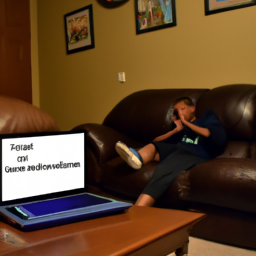Have you ever experienced a dream in which you’re in dire need of defending yourself, yet when you attempt to swing a punch, it’s as if your arm is sluggishly moving through molasses? Or even more disheartening, your punch lacks power and fails to make an impact? I’ve certainly found myself in such situations, and it’s both bewildering and vexing. Why is it that in my dreams, I’m unable to deliver a forceful punch?
There are several theories behind why our movements in dreams can feel sluggish or weak. Some suggest that it’s due to the way our brains process movement during REM sleep, while others point to the fact that we don’t have the same muscle memory and physical training in dreams as we do in real life.
In this article, we’ll explore the science behind dreaming and movement, as well as the psychological significance of dreams and how they relate to our physical health. We’ll also discuss techniques for lucid dreaming and taking control of our dream movements.
So, let’s dive in and find out why we can’t always pack a punch in our dreams.
Key Takeaways
- The brain turns off certain motor functions during REM sleep, resulting in weaker movements in dreams.
- Punching in dreams requires proper body positioning, weight distribution, and timing, which can only be achieved through practice and repetition in real life.
- Understanding the role of the brain in dreams can lead to a deeper understanding of ourselves, and paying attention to dreams can help address mental health issues.
- Lucid dreaming, the practice of becoming aware that you are dreaming and taking control of the dream, can be used to face fears or conquer anxieties in a safe, controlled environment.
The Phenomenon of Weak Punches in Dreams
You can’t punch hard in your dreams because your brain is limiting your physical abilities while you sleep. When we dream, the brain turns off certain motor functions that could potentially cause us to act out our dreams physically. This is a protective mechanism to prevent us from hurting ourselves or others while we sleep.
As a result, our movements in dreams are often weak and uncoordinated. While this phenomenon is well-documented, the exact mechanisms behind it are still being studied. Some theories suggest that the brain may be inhibiting the activity of certain neurotransmitters, while others propose that it may be related to the way that the brain processes sensory information during sleep.
Regardless of the exact cause, the fact remains that our physical abilities are severely limited while we dream, which can be frustrating for those who enjoy lucid dreaming or want to explore their physical potential in their dreams.
Theories Behind the Lack of Forceful Movement
I’ve always wondered why I can’t seem to punch hard in my dreams. After doing some research, I found that there are a few theories behind this phenomenon.
One theory is that during REM sleep, our brain paralyzes our muscles to protect us from acting out our dreams.
Another theory suggests that the lack of muscle memory and training in our dreams can make movements feel weaker.
Brain Protection During REM Sleep
Feeling frustrated that you can’t punch hard in your dreams? Blame your brain’s protective mechanisms during REM sleep. During this stage of sleep, the brain sends signals to the spinal cord to inhibit motor neurons, preventing us from acting out our dreams and potentially harming ourselves or others. This is known as muscle atonia, and it’s why we may feel paralyzed or have limited movement during our dreams.
While muscle atonia is a necessary protective mechanism, it can also be frustrating for those who want to experience more control and agency in their dreams. However, it’s important to remember that our brains prioritize safety and self-preservation, even in the unconscious state of dreaming. So, if you find yourself struggling to punch or move forcefully in your dreams, know that it’s simply your brain’s way of protecting you from potential harm.
| Emotion | Image | Description |
|---|---|---|
| Frustration | You feel irritated and annoyed that you can’t seem to control your movements in your dreams, despite your best efforts. | |
| Acceptance | You come to terms with the fact that muscle atonia is a necessary measure for your safety and well-being, and accept it as a natural part of the dreaming process. |
Now, let’s dive into the next section to explore another reason why we may struggle to punch hard in our dreams: lack of muscle memory and training.
Lack of Muscle Memory and Training
As in any other physical activity, the lack of proper muscle memory and training can also affect our ability to punch hard in our dreams. When we dream, our brain tries to simulate the experience of punching, but without the actual physical movement.
This means that our muscles are not actually moving, and therefore, we don’t have the physical feedback necessary to improve our technique. Additionally, punching in dreams requires a level of coordination that we may not have developed in real life.
Punching effectively requires proper body positioning, weight distribution, and timing, which can only be achieved through practice and repetition. Without consistent training, our brain may not have the necessary muscle memory to execute a powerful punch in our dreams.
Transitioning to the subsequent section about the science of REM sleep, it’s important to note that our brain’s activity during this stage is quite complex and fascinating.
The Science of REM Sleep
You can better understand why you can’t punch hard in your dreams by learning about the science of REM sleep. During REM sleep, the body’s muscles are temporarily paralyzed to prevent us from acting out our dreams. This is a safety mechanism to keep us from physically harming ourselves or others while we sleep.
Since punching requires physical movement, the paralysis of REM sleep makes it impossible for us to throw a powerful punch in our dreams. But the lack of physical movement isn’t the only reason why we can’t punch hard in our dreams.
Studies have also shown that the brain processes movement differently during REM sleep. This means that even if our muscles weren’t paralyzed, our brain wouldn’t be able to accurately simulate the movement of a punch. That’s why, when we try to punch in our dreams, we often feel like we’re moving in slow motion or that our punches have no force behind them.
However, this doesn’t mean that we can’t improve our punching ability in real life through muscle memory and training.
Muscle Memory and Training in Real Life
To improve your punching ability in real life, it’s important to develop muscle memory through consistent training. Professional boxers can throw up to 1000 punches per training session, and studies show that this muscle memory allows them to throw powerful punches without thinking about it.
To achieve this level of muscle memory, there are a few key things to keep in mind:
- Practice regularly, even if it’s just a few minutes each day.
- Focus on proper technique, rather than just throwing punches aimlessly.
- Use a punching bag or focus mitts to simulate real-life scenarios.
- Incorporate strength and conditioning exercises to improve overall fitness.
- Listen to your body and rest when necessary.
It’s not just about building up strength, but also about honing technique and timing. With consistent training, anyone can improve their punching ability and develop the muscle memory needed to throw powerful punches. This not only translates to real-life situations, but can also improve the physical sensations we experience in our dreams.
Speaking of dreams, while muscle memory plays a crucial role in our physical abilities, the role of the brain in dreaming is just as important.
The Role of the Brain in Dreaming
Get ready to explore how the brain plays a vital role in our dreaming experiences. When we dream, the brain is responsible for creating a vivid and complex world that often feels just as real as our waking life. It is also responsible for the limitations we experience in our dreams, such as the inability to punch hard.
Our brain is constantly processing sensory information and creating our reality, but in dreams, it is working with limited information. This can result in some strange and frustrating experiences, like feeling weak or unable to run fast.
In addition to the limitations we experience in our dreams, the brain is also responsible for creating the emotional and psychological significance of our dreams. Dreams can be a reflection of our fears, desires, and anxieties, and they can be a way for our subconscious to work through unresolved issues.
Understanding the role of the brain in our dreams can help us gain insight into our own psyche and lead to a deeper understanding of ourselves. So, let’s delve into the psychological significance of dreams and uncover the mysteries of our subconscious mind.
The Psychological Significance of Dreams
The mind is like a puzzle, and dreams offer a glimpse into the hidden corners and pieces that make up our psyche.
Dreams are often symbolic in nature, with each element representing something significant in our lives. For example, a dream about falling may represent a fear of failure or a lack of control in a particular aspect of our lives.
Dreams can also help us process emotions and experiences that we may not be able to fully comprehend while awake.
Understanding the psychological significance of our dreams can help us gain insight into our subconscious and address any issues that may be affecting our mental health.
Additionally, there’s a connection between dreaming and physical health. Research has shown that getting enough quality sleep, which includes sufficient time in the REM stage where most dreaming occurs, is crucial for overall health and well-being.
Therefore, paying attention to our dreams and taking steps to improve our sleep can have a positive impact on both our mental and physical health.
The Connection Between Dreaming and Physical Health
I’ve always known that getting enough sleep is important for my physical health, but I never realized how much it could affect my mental health as well.
As it turns out, dreaming plays a crucial role in maintaining our mental wellbeing.
Not only that, but research suggests that the quality of our sleep and the frequency of our dreams may have significant impacts on our physical health too.
The Effects of Sleep on Physical Health
During sleep, our muscles become relaxed and inactive, which may explain why we can’t punch hard in our dreams. This is because our brain sends signals to our muscles to prevent us from acting out our dreams in real life and potentially harming ourselves or others. This is known as REM atonia, a state of temporary paralysis that occurs during rapid eye movement (REM) sleep.
However, the effects of sleep on physical health go beyond just muscle relaxation. Sleep is essential for the body to repair and regenerate itself, including the muscles. In fact, studies have shown that lack of sleep can lead to decreased muscle mass and strength, as well as impaired athletic performance.
So while we may not be able to punch hard in our dreams, getting enough quality sleep can ultimately lead to better physical health and performance in waking life. This is just one aspect of the importance of dreaming for both physical and mental health.
The Importance of Dreaming for Mental Health
As I learned about the effects of sleep on physical health, I couldn’t help but wonder about the purpose of dreaming. It turns out that dreaming isn’t just a random occurrence during sleep, but it serves an important purpose for our mental health.
Dreams are a way for our brains to process emotions, memories, and experiences, allowing us to regulate our emotions and cope with stress. Studies have shown that REM sleep, the stage of sleep where dreams occur, is crucial for our mental well-being.
When we dream, our brains are able to integrate new information with existing knowledge, helping us to learn and adapt to new situations. Dreaming can also help us problem-solve and be more creative. Understanding the importance of dreaming has made me more aware of the quality of my sleep and the impact it has on my overall mental health.
With the knowledge that dreams serve an important purpose, it’s no wonder that dreams have been a topic of fascination throughout history and across cultures. From ancient civilizations interpreting dreams as messages from the gods, to modern psychology exploring the symbolism and meaning behind our dreams, dreams have played a significant role in our understanding of the human mind.
Let’s delve into the history and cultural significance of dreams.
The History and Cultural Significance of Dreams
You can’t deny the fact that dreams have played a significant role in shaping cultures throughout history.
In ancient civilizations, dreams were seen as messages from the gods and were often interpreted as warnings or guidance. The Greeks believed that dreams were a way for the gods to communicate with mortals, while the Egyptians believed that dreams could predict the future. Dreams were also important in Native American cultures, where they were seen as a way to connect with the spirit world.
Throughout history, dreams have been used for creative inspiration and problem-solving. Many famous artists, writers, and scientists have credited their dreams for providing them with insights and breakthroughs. For example, the scientist Nikola Tesla claimed that many of his inventions came to him in his dreams.
The cultural significance of dreams has led to a fascination with lucid dreaming and the ability to control one’s dreams. This desire for control has led to the development of various techniques and practices, which we will explore in the next section.
Techniques for Lucid Dreaming and Control
As fascinating as it is to explore the history and cultural significance of dreams, what I find even more intriguing is the ability to control them.
Lucid dreaming is the practice of becoming aware that you are dreaming and then taking control of the dream. This can allow you to do everything from flying to meeting your favorite celebrity. However, what interests me the most is the ability to punch hard in my dreams.
Lucid dreaming is not a new concept, but in recent years, there’s been a surge in interest in the topic. There are various techniques that one can use to induce lucid dreaming, such as reality checking, keeping a dream journal, and practicing meditation.
Once you become aware that you are dreaming, you can practice controlling the dream. This can include changing the scenery, talking to dream characters, and even manipulating your own physical abilities, such as punching hard. With practice, you can become more skilled at controlling your dreams and even using them to improve your waking life.
Imagine being able to live out your wildest fantasies in a world where anything is possible. The feeling of power and control over your own subconscious mind is exhilarating. The ability to face your fears or conquer your anxieties in a safe, controlled environment can be life-changing. The realization that your dream world is just as real as your waking world can be mind-blowing. The sense of accomplishment and satisfaction from mastering the art of lucid dreaming is unmatched.
Frequently Asked Questions
How do I remember my dreams better?
I’ve found that keeping a dream journal by my bed and writing down any details I can remember as soon as I wake up helps me remember my dreams better. It’s amazing what can surface when I take the time to reflect on them.
Can I control who appears in my dreams?
I have found that I can influence who appears in my dreams by consciously thinking about them before I fall asleep. However, controlling every aspect of my dreams is not always possible.
What happens if I die in my dreams?
If I die in my dreams, it doesn’t mean I’ll die in real life. It’s just a manifestation of my subconscious. However, it can be unsettling and lead to nightmares.
Can dreams predict the future?
As the saying goes, "the future is not set in stone."While dreams can sometimes offer insights or symbolic representations of our hopes and fears, they cannot predict the future with certainty.
Why do some people have more vivid dreams than others?
Some people have more vivid dreams than others due to factors such as stress, sleep quality, and individual brain chemistry. It’s a natural variation in our experiences while sleeping.
Conclusion
As I lay in bed, reflecting on my weak punches in dreams, I realize that it symbolizes my deep-rooted fears and insecurities. In my waking life, I may feel powerless and unable to control my surroundings.
However, by acknowledging and facing these fears, I can learn to overcome them and gain confidence in myself. Dreams may seem like a mysterious and perplexing phenomenon, but they provide insight into our subconscious minds.
By understanding the science and psychology behind dreaming, we can unlock the power of our minds and use it to improve our physical and mental health. So, next time I find myself throwing weak punches in my dreams, I’ll use it as a reminder to confront my fears and take control of my life.









